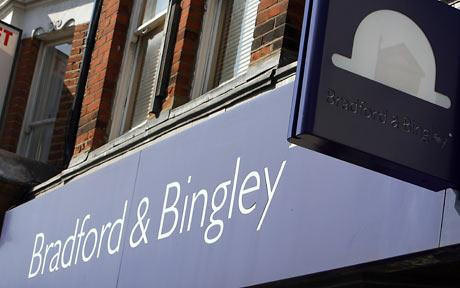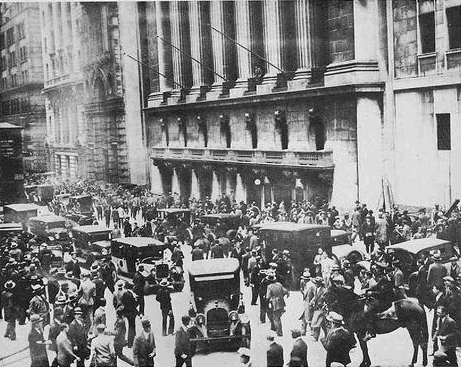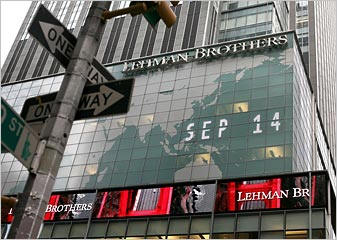|
Britain's
Bradford & Bingley becomes latest victim |
 |
|
B&B, the eighth
largest mortgage lender, is the latest
banking institution to become a victim
of the financial crisis and the
deteriorating state of the housing
market. Its shares fell six per cent to
an all-time low of 20p as it became
clear that no rival bank was prepared to
mount a rescue bid. Since the start of
the year, B&B shares have fallen 90 per
cent. However, the British Banking
Association reassured the 2.5 million
customers who have £22 billion deposited
with B&B. "Customers have no need to
worry about any deposits in any British
bank. "The Financial Services
Compensation Scheme covers all savings
up to £35,000, which... covers 96 per
cent of all banking customers." Treasury
officials intervened in an attempt to
find a private-sector solution. However,
banking sources said that with no
private buyer coming forward, B&B would
have to be nationalised, resulting in a
possible merger with Northern Rock. A
B&B spokesman said: "We are fully-funded
and we are one of the strongest
capitalised banks in the UK. "As far as
the febrile speculation goes, we do not
comment on market rumours." The bank
said it is in no immediate danger
because it has funding in place until
2009. But it has effectively closed for
new mortgage business after cutting 300
jobs in its mortgage centre on Thursday.
If B&B were to fail, it would join a
growing list of major financial
institutions around the world that have
been swept up in the economic turmoil.
Financial specialists warn that if
Congress fails to agree on a proposed
$700 billion bail-out package for the US
economy the list will grow. |
|
|
John Francis Kinsella's novel, Borneo Pulp,
tells the story of how a group of
industrialists planned the destruction
of Borneo's rain forests in their race
for profits. |

|
In the last decades of the
twentieth century the destruction of the
Indonesian rainforest accelerated with the
arrival of large multinational forestry industry
companies. The promoters are Europeans,
Indonesians and Taiwanese, backed by
international banks who vie for a share in the
rich rewards, in total disregard for the
destruction that will be wreaked on the habitat
of the indigenous peoples and the terrible
effect that the mill would have on the natural
environment. John Ennis arrives in Jakarta, on
behalf of the consortium formed to promote the
project, where he discovers an unexpectedly new
world. Assigned to head the development by
Antoine Brodzski the promoter and a Scandinavian
multinational, he is plunged into a conflict of
financial and political interests in Suharto’s
Indonesia, where dollars are more important than
the obliteration of huge swaths of Borneo’s
primary forests and its unique wildlife and
ecosystem. |
|
|
|
|
|
WORLD FINANCE TAKES A
HIT |

|
Markets plunge
after House
rejects
financial rescue
bill. To many
the present
crises recalls
memories of the
Crash of 1929 ,
one of the most
devastating
stock market
crash in the
history of the
United States,
taking into
consideration
the full scope
and longevity of
its fallout.
Three
phrases—Black
Thursday, Black
Monday, and
Black
Tuesday—are used
to describe this
collapse of
stock values.
All three are
appropriate, for
the crash was
not a one-day
affair. The
initial crash
occurred on
Black Thursday
(October 24,
1929), but it
was the
catastrophic
downturn of
Black Monday and
Tuesday (October
28 and October
29, 1929) that
precipitated
widespread panic
and the onset of
unprecedented
and long-lasting
consequences for
the United
States. The
collapse
continued for a
month. |
|
|
|
|
LEHMAN
FAILS AIG
NATIONALIZED |

|
In one
of the most
dramatic
days in Wall
Street
history,
Lehman
Brothers
said it
would file
for Chapter
11
bankruptcy,
while
Merrill
Lynch agreed
to sell
itself to
Bank of
America for
about $50
billion. As
the fates of
Lehman and
Merrill hung
in the
balance,
another
crisis
loomed as
the
insurance
giant
American
International
Group
appeared to
teeter.
Staggered by
losses
stemming
from the
credit
crisis,
A.I.G.
sought a $40
billion
lifeline
from the
Federal
Reserve,
without
which the
company may
have only
days to
survive. The
Treasury and
Federal
Reserve have
already
stepped in
on several
occasions to
rescue the
financial
system,
forcing a
shotgun
marriage
between
Bear Stearns
and
JPMorgan
Chase
this year
and
backstopping
$29 billion
worth of
troubled
assets — and
then
agreeing to
bail out
Fannie Mae
and Freddie
Mac only
this month.
For Bank of
America,
which this
year bought
Countrywide
Financial,
the troubled
mortgage
lender, the
purchase of
Merrill puts
it at the
pinnacle of
American
finance,
making it
the biggest
brokerage
house and
consumer
banking
franchise.
Concerning
the Fed,
both Mr.
Paulson and
Mr. Bernanke
were worried
that they
had already
gone much
further than
they had
ever wanted,
first by
underwriting
the takeover
of Bear
Stearns in
March and by
the far
bigger
bailout of
Fannie Mae
and Freddie
Mac. |
|
|
BUSH LOOKS AT TRUTH
HEAD-ON |
 |
|
Henry
Paulson's ploy may not
stop credit crunch
spreading. What is
apparent now is the
extent that the seizing
up of the world
financial system is the
problem of us all, and
not just a few overpaid
Wall Street plutocrats.
That European
Schadenfreude that saw
it all as the fault of
the turbo-charged
Anglo-Saxon financial
system has taken a
battering after the
bailouts of Fortis and
Dexia of Belgium, Hypo
Real Estate of Germany
and Iceland’s Glitnir,
the near-collapse of
Italy’s Unicredit, and
the government support
packages for Irish and
Greek banks. Part of the
problem, politically and
philosophically, of
putting together the
Paulson package has been
the impossibility of
decoupling the interests
of the bankers and the
banks. I |
|
|
|

|
Government
Seizes WaMu in the biggest
bank failure in history,
JPMorgan Chase will acquire
massive branch network and
troubled assets from
Washington Mutual for $1.9
billion. Washington Mutual,
the giant lender that came
to symbolize the excesses of
the mortgage boom, was
seized by federal regulators
on Thursday night, in what
is by far the largest bank
failure in American history.
Regulators simultaneously
brokered an emergency sale
of virtually all of
Washington Mutual, the
nation’s largest savings and
loan, to JPMorgan Chase for
$1.9 billion, averting
another potentially huge
taxpayer bill for the rescue
of a failing institution.
The move came as lawmakers
reached a stalemate over the
passage of a $700 billion
bailout fund designed to
help ailing banks, and
removed one of America’s
most troubled banks from the
financial landscape.
Customers of WaMu, based in
Seattle, are unlikely to be
affected, although
shareholders and some
bondholders will be wiped
out. WaMu account holders
are guaranteed by the
Federal Deposit Insurance
Corporation up to $100,000,
and additional deposits will
be backed by JPMorgan Chase.
By taking on all of WaMu’s
troubled mortgages and
credit card loans, JPMorgan
Chase will absorb at least
$31 billion in losses that
would normally have fallen
to the F.D.I.C. JPMorgan
Chase, which acquired Bear
Stearns only six months ago
in another shotgun deal
brokered by the government,
is to take control Friday of
all of WaMu’s deposits and
bank branches, creating a
nationwide retail franchise
that rivals only Bank of
America. But JPMorgan will
also take on Washington
Mutual’s big portfolio of
troubled assets, and plans
to shut down at least 10
percent of the combined
company’s 5,400 branches in
markets like New York and
Chicago, where they compete.
The bank also plans to raise
an additional $8 billion by
issuing common stock on
Friday to pay for the deal. |
|
|
|
|
|
|
Financial
Crisis: US
will lose
superpower
status |
|
German
minister German finance
minister Peer
Steinbrück has
slammed
Anglo-American
capitalism for
endangering global
stability in its
lust for profit and
predicted that the
US would now be
toppled as the
superpower of
international
finance. Senior
politicians in
France and Germany
have in recent weeks
called for a radical
shake-up of the
market system. A
powerful EU faction
that has always been
hostile to the City
of London – which is
known in Brussels as
“the casino” – see
this crisis as a
rare chance to ram
through irreversible
changes.
|
|
|
|
|
|
$700 BILLION
BAILOUT FOR WALL STREET |
|
The enormity of the financial
crisis now engulfing Wall Street has led the
Bush administration to abandon its free-market
principles and announce a $700bn bail-out
package to buy up distressed financial assets.
At the same time, to stem growing panic among
individual investors, the Treasury also plans to
offer guarantees for the $3.2 trillion in money
market mutual funds, which many people had
treated as cash. However, the US Treasury’s $700
billion (£380 billion) plan to bail out the
banks could undermine the dollar, economists
warn. The plan, details of which were unveiled
yesterday, will seek congressional approval to
raise the total amount the US government can
borrow from $10.6 trillion to $11.3 trillion. It
also gives Hank Paulson, the US Treasury
secretary, immunity from legal challenge under
the plan. The US Treasury will buy
mortgage-related securities “from any financial
institution having its headquarters in the
United States”, draft legislation said.
Securities issued before September 17 will be
eligible for inclusion. Word of the proposals
created a mood of euphoria in financial markets
on Friday. But analysts warned of the risks. |
|
Russians
Reinstate Romanov Royal Family ninety
years after the Bolshevik Rising in 1917 with
the annihilation of the Russian Royal Family, a
supreme court in the country has now declared
the unfortunate family victims of political
repression and ordered their official
rehabilitation. Nine decades after a Bolshevik
execution squad gunned down the last tsar of
Russia and his family, the country's supreme
court has declared the imperial dynasty victims
of political repression, marking the official
rehabilitation of the house of Romanov. The
decision overturns a lower court ruling that
classified the killings as plain murder, and
exonerates Tsar Nicholas II and his family of
the alleged crimes the Bolshevik regime used to
justify their killing. |
|
|